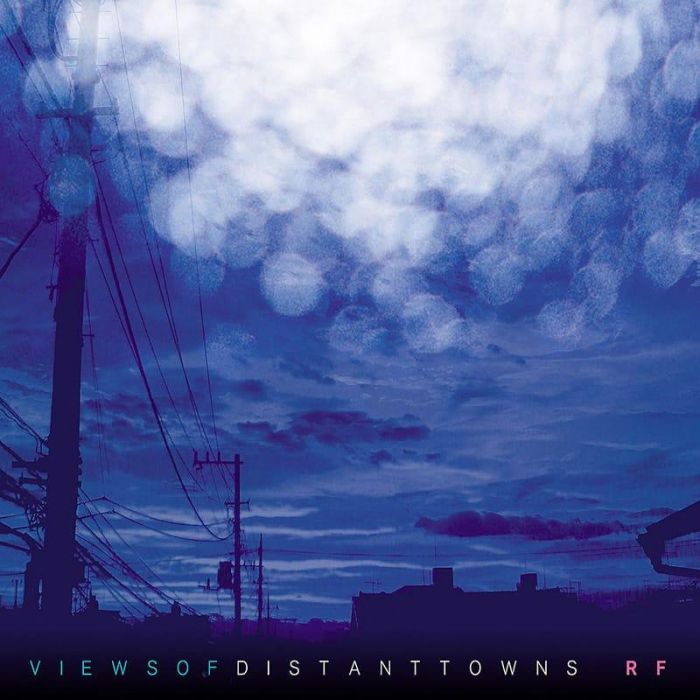Views of Distant Towns by Rf (Review)

Back in June of 2004, Ryan Francesconi’s electronic music, which he records under the moniker RF, was featured by the popular MP3 blog 3hive. 3hive described it as the perfect accompaniment to a Haruki Murakami novel. Francesconi apparently took that comparison to heart: his latest album, Views of Distant Towns, is heavily inspired by the works of Murakami, specifically Murakami’s most famous novel, The Wind-Up Bird Chronicle.
However, and this is no slight on Francesconi, Views of Distant Towns actually works a little better for me when I think of it as separate from Murakami’s work. One of the things I most “enjoyed” about The Wind-Up Bird Chronicle was the amazing, almost nightmarish anxiety that Murakami was able to conjure up at times, as well as the utter alienness of the situations he described that greatly belied his lethargic writing style.
There are a handful of tracks that certainly tap into that darkness, such as the somber “Of Detachment” and especially “On the Bus That I Had Chosen” with its mournful, elegiac string arrangement and synth treatments. However, Views of Distant Towns ultimately moves in a different direction, and as a result, it might be the lightest, most accessible album that Francesconi has released yet. That being said, it still captures into the meandering melancholy and sense of longing that characterizes Murakami’s writing.
Even if Views of Distant Towns is more accessible than RF’s previous albums, 2004’s Falls and 2002’s Interno, don’t expect to find any fewer abstract electronic elements and whatnot. Views of Distant Towns is still yet another showcase for Francesconi’s amazing and skillful blending of electronic elements (e.g., laptop processing, glitches, other forms of software-based tweaking) with an orchestra of traditional instruments (e.g., guitars, bass, dobro, trombone, piano, violin, cello, xylophone, drums).
Unlike so many other similar artists, which just slap whatever they’ve done over something they cobbled together in Fruity Loops, Francesconi tweaks and blends every element until it’s virtually impossible to tell where the electronic ends and the acoustic begins.
There are moments where it seems like every plucked guitar note, cymbal brush, trumpet gasp, violin melody, and human sigh has been run through some sort of filter, tweaked just enough to give it a slightly surreal bent, transforming the ordinary into something “other” (yet another Murakami parallel). And of course, there are the purely electronic elements that drift in the background, their presence often barely felt and yet coloring and shading the songs in almost spiritual ways. I’m referring here to the rain-like patter of programmed beats, globs of glitch that sound almost organic and aqueous, and ghostly tendrils of synth drone.
It all comes together in the most graceful and sublime of ways. For example, I’m listening to “Despite the Time” as I type this sentence. The song riffs on a musical motif that should anyone familiar with RF’s previous albums should recognize, and the results are simply gorgeous. Wisps of melancholy horns, a playful bassline, ghostly vocals whispering “We change after, despite the time/Despite the words, despite the time,” lightly reverbed guitars — these are all buried under a constantly shifting, shimmering layer of digital gurgles and drizzle. And while all of Francesconi’s music has a nostalgic quality to it, the presence of the recycled motif makes it even moreso, as it references and pulls in the moods from previous RF releases.
All in all, it almost feels sacrilegious to listen to the song and attempt to peel back all of its layers on a day as bright and sunny as the one I’m experiencing right now. Rather, it seems more appropriate for a stormier day, where the music can blend in with the soft sounds of rain outside the window.
As Views of Distant Towns progresses, Francesconi introduces field recordings from a recent trip to Japan. The recordings run the gamut from the sounds of crickets chirping on a summer day to the hustle and bustle of a train station to random conversations and spoken word bits. These field recordings ground Francesconi’s otherwise otherworldly music in the here and now, and yet as someone whose Japanese vocabulary consists almost entirely of things I’ve learned from anime and samurai movies, the language also adds yet another layer of surrealism and “other”-ness.
It’s always difficult to pick out individual tracks on an RF release and discuss them. There are certainly tracks on this disc that stick out to me moreso than others, such as “The Flow of This Place” (which sounds like a possible collaboration between Bows and The Cycle of Days and Seasons-era Hood) and the title track, as well as the aforementioned songs. However, even moreso than RF’s other albums, it’s almost imperative that you listen to Views of Distant Towns as a whole piece. Doing otherwise would mean missing out on the incredible sense of flow that this album possesses, and on all the ways that the nuances and details unfurl and reveal themselves.
In discussing Views of Distant Towns, Francesconi mentions one scene from The Wind-Up Bird Chronicle that can be seen as an important parallel to the album. The book’s main character, a rather nondescript man named Toru, has had his entire life turned upside down, with almost metaphysical forces drawing him into a terrible spiritual conflict. In this particular scene, Toru sits on a bench near a station and spends days watching the faces of the passersby, allowing himself to become lost within the crowds. Such a scene serves as an accurate description of the experience of listening to RF’s music, as it is very much the sort of music you want to just sit and observe, and get lost in. Indeed, the drifting nature of these songs practically demands that you do so.
More information can be found on RF’s homepage. Views of Distant Towns has been released on Plop. Full-length songs can be heard on RF’s MySpace page.